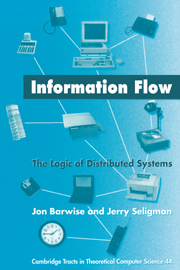1 - Information Flow: A Review
Published online by Cambridge University Press: 05 November 2011
Summary
The three lectures in the first part of the book present an informal overview of a theory whose technical details will be developed and applied later in the book. In this lecture we draw the reader's attention to the problems that motivated the development of the theory. In Lecture 2 we outline our proposed solution. A detailed example is worked out in Lecture 3.
In the course of the first two lectures we draw attention to four principles of information flow. These are the cornerstones of our theory. We do not attempt to present a philosophical argument for them. Rather, we illustrate and provide circumstantial evidence for the principles and then proceed to erect a theory on them. When the theory is erected, we shall be in a better position to judge them. Until that job is done, we present the principles as a means of understanding the mathematical model to be presented – not as an analysis of all and sundry present day intuitions about information and information flow.
The Worldly Commerce of Information
In recent years, information has become all the rage. The Utopian vision of an information society has moved from the pages of science fiction novels to political manifestos. As the millennium approaches fast on the information highway, the ever-increasing speed and scope of communication networks are predicted to bring sweeping changes in the structure of the global economy.
- Type
- Chapter
- Information
- Information FlowThe Logic of Distributed Systems, pp. 3 - 25Publisher: Cambridge University PressPrint publication year: 1997



